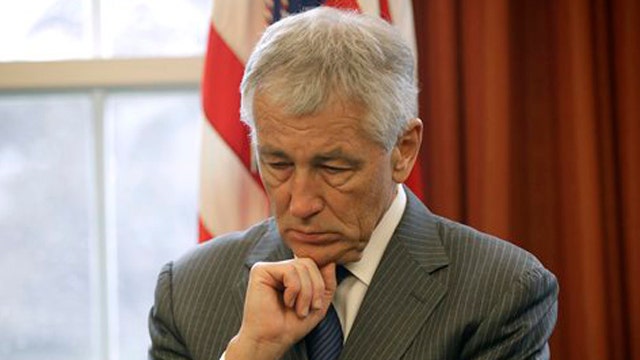The military has halted production of its new medal for drone- and cyber-warfare, ordering a review in response to complaints about what some have derisively dubbed the "Nintendo" medal.
A Pentagon spokesman confirmed Tuesday that Defense Secretary Chuck Hagel has asked Joint Chiefs Chairman Gen. Martin Dempsey to lead a review and report back in 30 days in light of the controversy.
At issue is the newly created Distinguished Warfare Medal, which was to be awarded to troops who operate drones and use other technological skills to fight America's wars from afar -- most controversial was the fact that it has been ranked above medals for those who served on the front line in harm's way, such as the Purple Heart given to wounded troops.
Rep. Duncan Hunter, R-Calif., who has introduced a bill to lower the medal's ranking, said the award is "widely viewed as an award that undermines all other valor awards and the reverence for servicemembers who face the dangers of direct combat."
"It's a fact that those who are off the battlefield do not experience the same risks. Pretending they do devalues the courageous and selfless actions of others, who, during combat, do the unthinkable or show a willingness to sacrifice their own lives," he said in a statement.
If the review agrees with that complaint about the medal, it would likely have to be renamed and new medals manufactured, a government official said on condition of anonymity because he was not authorized to speak on the record.
There is a practical side to the rankings. There are grades of medals -- commendation, merit, distinguished -- that affect not only the name but promotions for those still serving in uniform. Each grade gives troops a certain number of points needed for promotions.
Former Defense Secretary Leon Panetta announced the new medal last month, saying it was meant to recognize battlefield contributions in a world of changing warfare.
"I've seen firsthand how modern tools, like remotely piloted platforms and cyber systems, have changed the way wars are fought," Panetta said. "And they've given our men and women the ability to engage the enemy and change the course of battle, even from afar."
Over the last decade of war, remotely piloted Predator and Reaper drones have become a critical weapon to gather intelligence and conduct airstrikes against terrorists or insurgents around the world. They have been used extensively on the battlefields in Iraq and Afghanistan, as well as in strikes in Pakistan, Yemen and northern Africa.
Over the same time, cyberattacks have become a growing national security threat, with Panetta and others warning that the next Pearl Harbor could well be a computer-based assault.
Officials said in announcing the medal last month that it would be the first combat-related award to be created since the Bronze Star in 1944. And they said that in recognition of the evolving 21st century warfare, the medal would be considered a bit higher in ranking than the Bronze Star, but lower than the Silver Star.
The Veterans of Foreign War and other groups say that ranking it ahead of the Bronze Star and Purple Heart is an injustice to those who served on the front-lines.
John Bircher, a spokesman for the Military Order of the Purple Heart, has said the veterans groups are not objecting to the medal -- just the ranking. He said some medals ranked ahead of the Purple Heart are achievement medals that can be earned outside of war time. What bothers many veterans is that the new Distinguished Warfare Medal appears be a war-time medal that trumps acts of valor, which he finds insulting.
The backlash to the Pentagon's announcement included an online petition to the White House signed by thousands of people. The petition called the medal "an injustice to those who served and risked their lives" and asked that it not be allowed to move forward as planned.
The Associated Press contributed to this report.






















